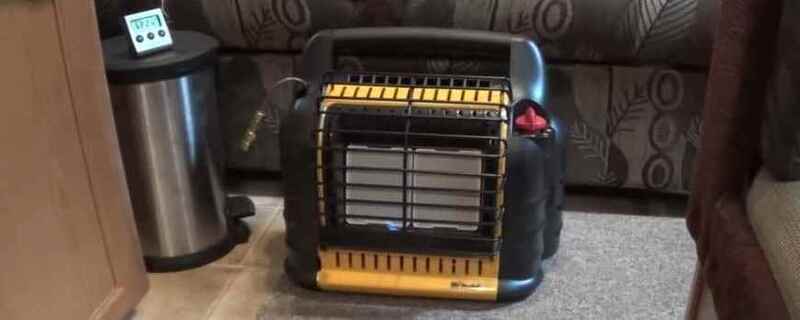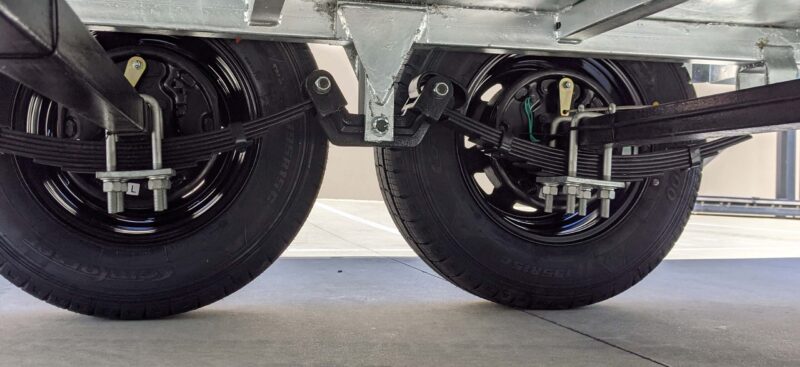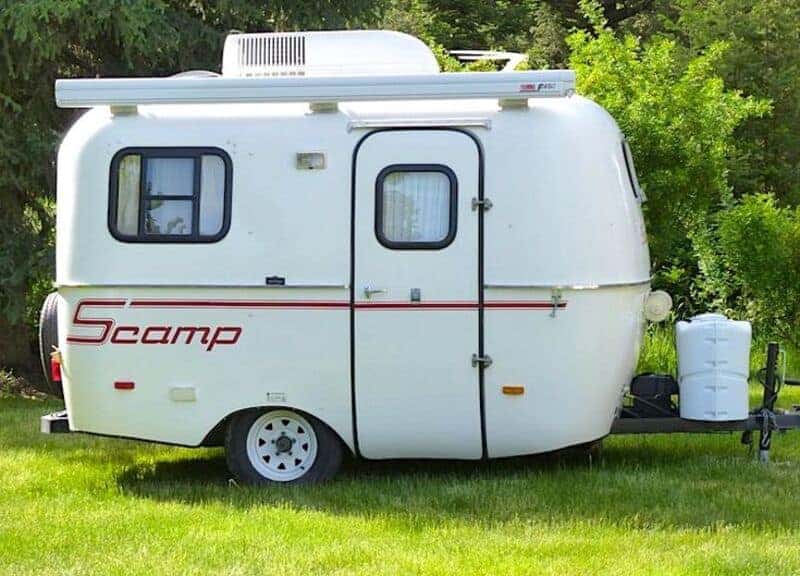Space heaters for campers are a great option for RVers who like to travel in the winter. They are safe when used properly and can help to supplement your furnace in really cold weather.
Space heaters are also good to take the chill off in the morning, even when you RV in cooler weather during the spring and fall.
Read on to answer some of your questions about space heaters for campers and check out some of our favorites.
Why Use a Space Heater in An RV?
Space heaters are a great additional heat source in cold weather but remember, if you have a four-season RV, it is the furnace that provides heat to your underbelly. In below-freezing weather, you will need to run the furnace to keep pipes from freezing. You might want to consider adding tank warmers and skirting if you stay in cold climates.
Using a space heater can cut down or eliminate propane use during cold weather. Propane can be expensive, and an average-sized 30,000 BTU furnace will burn around a gallon of propane every three hours.
A 20-pound tank will last anywhere from 3-7 days while boondocking. Don’t forget, you will also need propane to power your refrigerator, your water heater, and cooktop in a boondocking situation.
Space heaters provide that extra heat that will keep your furnace from running all the time. Space heaters are also quieter than many furnaces.
What Are the Different Types of Space Heaters?
When you start shopping for space heaters, you’ll come across 4 main types. Each has its pros and cons and all can work as space heaters for campers.
Ceramic Space Heaters
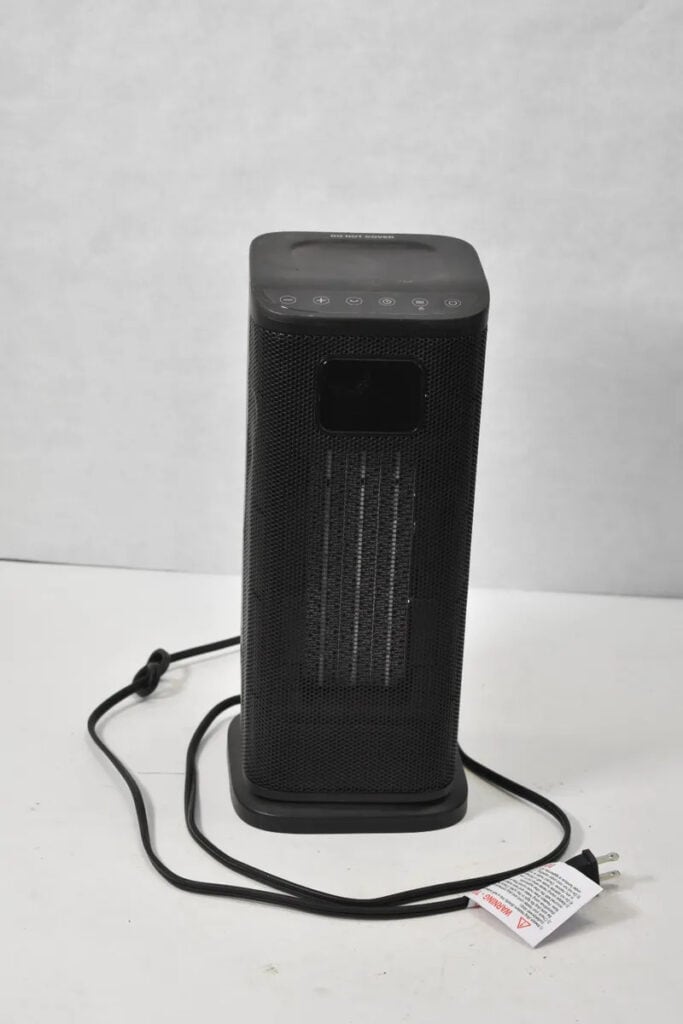
Ceramic heaters work by heating metal coils that are surrounded by ceramic plates. The plates help to distribute the heat evenly and the coils heat up when electricity is passed through them.
This type of heater is more energy efficient than other types. They warm up quickly and store heat in the ceramic material. They are also good for heating a small room but are not good for heating large rooms and they consume a lot of electricity. In general, they are less expensive than other types of heaters.
Infrared Space Heaters
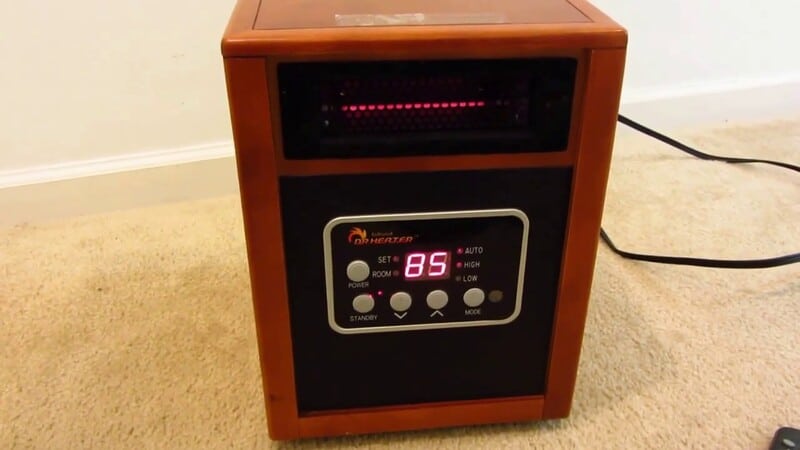
Infrared heaters are very efficient and use less electricity to provide the same amount of heat as a ceramic heater. They work by converting electricity into radiant heat, which is the same feeling of warmth you get from the sun on your face or the heat from a fireplace.
These types of heaters are more expensive than other types and can start around $150. They are quieter because there is no built-in fan and require less maintenance than other types of heaters.
Infrared heaters can be wall-mounted which makes them less portable than others.
Micathermic Space Heaters
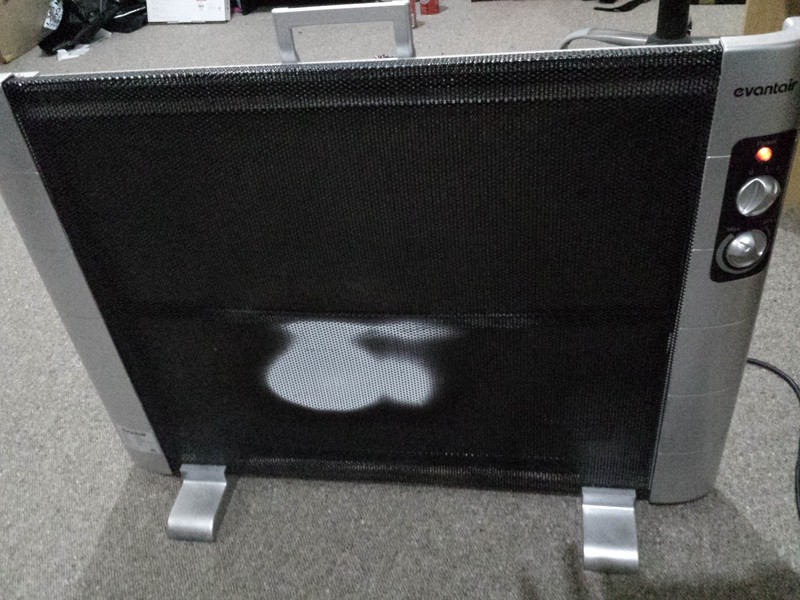
When the mica in the unit is heated, electromagnetic rays are emitted into the room. The rays heat the room similarly to sunlight providing radiant heat. These are similar to an infrared heater.
Micathermic heaters are fast and can reach their maximum heat in about one minute. They are quiet, and light and are ideal for small living areas. They are touted as an extremely efficient and money-saving type of space heater.
The exterior of this heater can get quite hot, so it might not be good if you have children or pets.
Oil-filled Space Heaters
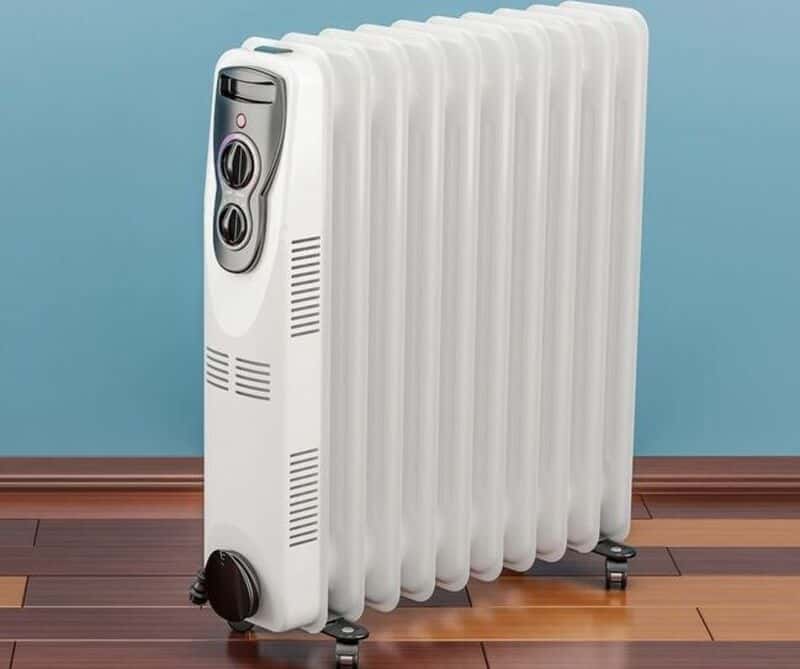
Oil-filled heaters work by using an electrical element to heat a reservoir of oil inside the appliance. The electrical element is submerged in the oil so that when it heats up, the warmth created is transferred to the surrounding oil.
This type of space heater cycles on and off to maintain its temperature and saves you money in the process. The oil does not need to be replenished, because it is not used as fuel.
Oil heaters gradually produce heat so they can be slower to warm up the room. It could take as much as 20-30 minutes. They can also be bulkier and less portable.
With built-in safety features, oil heaters can be as safe as other types of heaters.
Propane Space Heaters
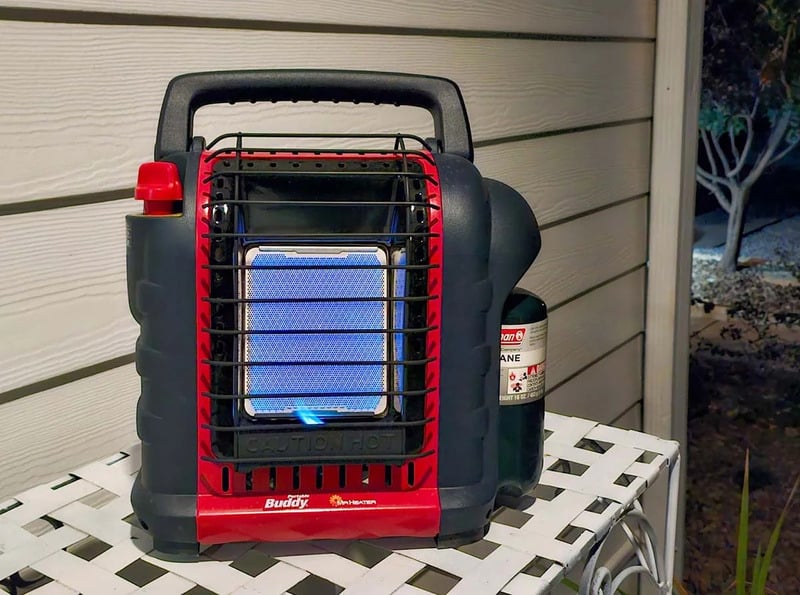
When properly used, propane heaters are a safe and effective way to heat your RV. However, you must provide ventilation (crack a window or open a vent) when the heater is in use.
Indoor propane heaters should have an automatic shutoff mechanism that turns the heater off if too much carbon dioxide accumulates. A low oxygen sensor is also an important feature of your propane space heater.
Propane heaters should also be kept away from anything that could catch fire.
Indoor propane heaters can be portable, wall-mounted, forced air, or radiant types.
Space Heater Options for Campers
Check out our top space heaters for campers.
Lasko Ceramic Tower Heater
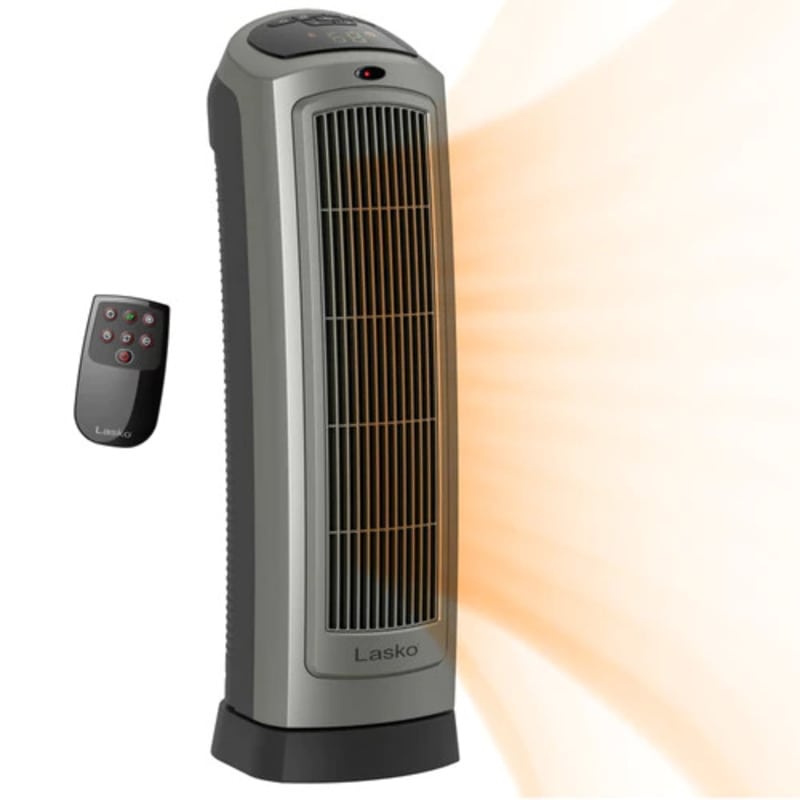
The elongated heat element of the Lasko Ceramic Tower Heater improves your comfort level as the 1,500 watts provide plenty of warmth and comfort.
This space heater is easy to use with electronic touch control operation, plus a multi-function remote control. It has two heat settings, plus an auto thermostat mode. It has a convenient carry handle for easy mobility.
Price: $50
Dr. Infrared Heater
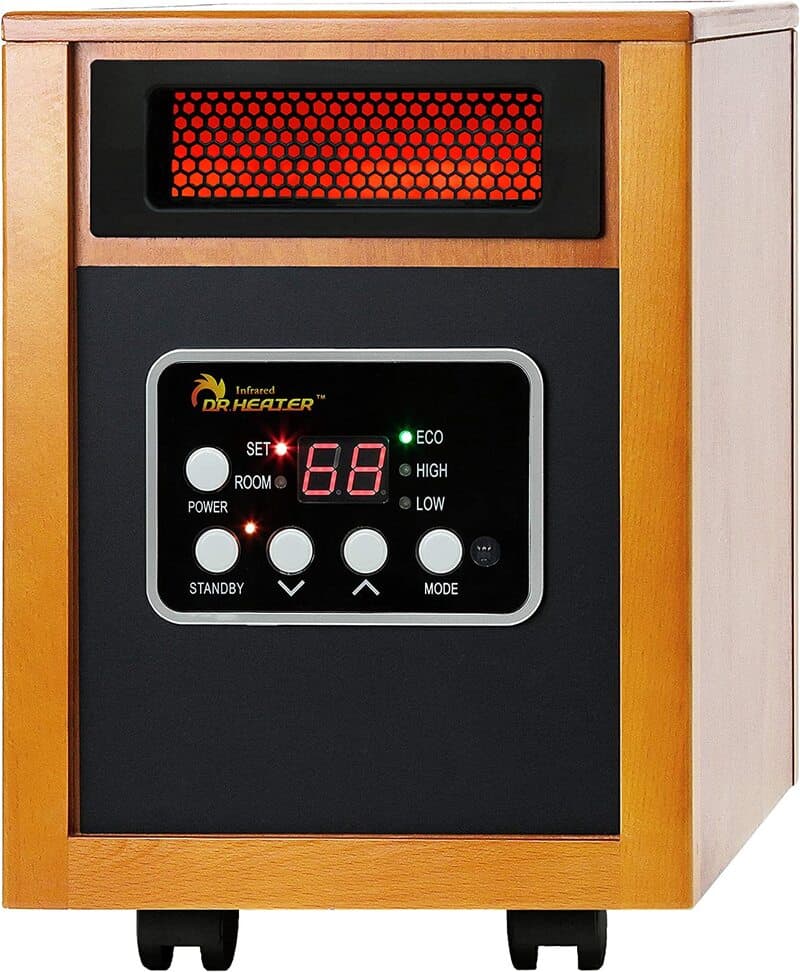
The Dr. Infrared Heater combines ultrasonic mist vapor with oscillation to increase the heat transfer rate, producing a superior level of comfort. It can take the place of three appliances working as a built-in humidifier while oscillation distributes the warm, moist air throughout the room.
As an RV space heater, Dr. Infrared is energy efficient with state-of-the-art technology. It also has tip-over and auto shut-off features for safety. It is also quiet, keeping your RV warm and peaceful.
Price: $159.99
Pelonis Oil Filled Heater
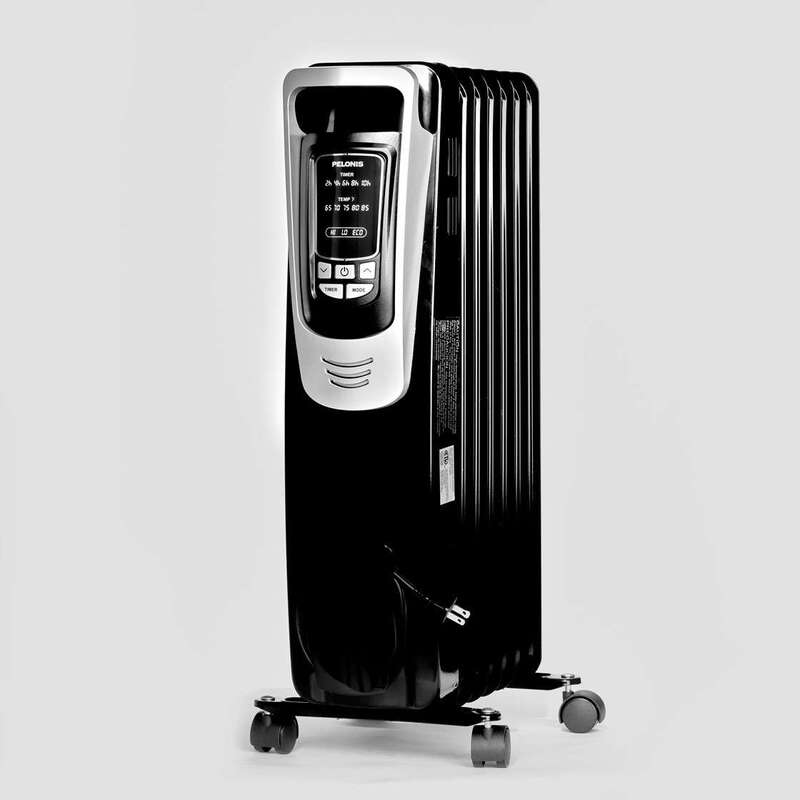
The Pelonis Oil Filled Heater has three heating options and five temperature settings to get the comfort you need. The user-friendly features include an LCD screen, programmable thermostat, remote control, and 10-hour timer. The 4-swivel caster wheels, capable of 360-degree rotation, provide easy portability.
Safety features include a power indicator light, over-heat protection, and a tip-over safety switch.
The oil-filled heater is quiet while keeping your space warm and cozy.
Price: $78.99
DeLonghi Mica Panel Heater
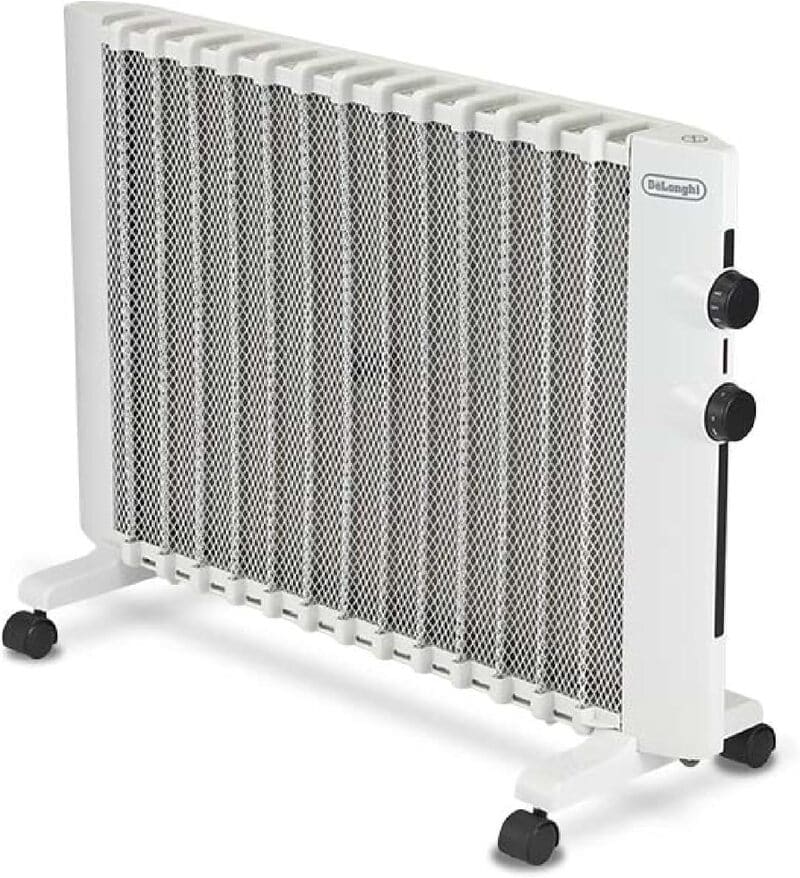
The DeLonghi mica panel heater provides everything you need to keep warm in your RV. It features easy-to-use controls, an adjustable thermostat, multiple heat settings, and a slim design.
DeLonghi makes this mica heater lightweight and portable and it delivers a gentle heat that won’t stir up dust, pollen, or dander, creating a better breathing environment that is more allergy-friendly.
Safety features include a thermal shut-off, an internal tip-over switch, and a standby setting that helps to prevent frozen pipes. The 1,500-watt heater is floor-standing or wall-mountable.
Price: $99.95
Big Buddy Propane Heater
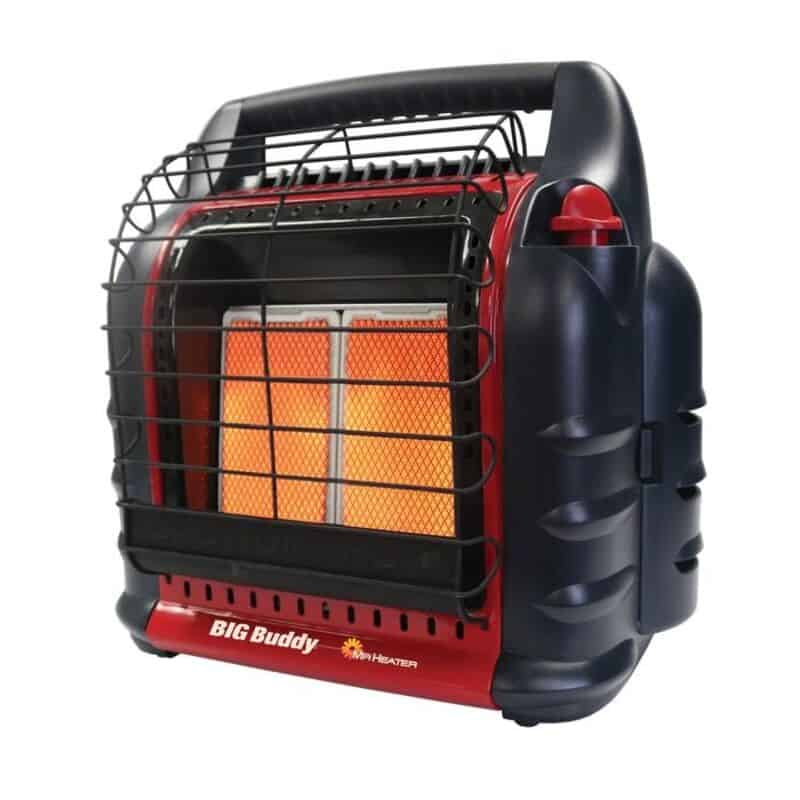
The Big Buddy Propane Heater, by Mr. Heater, heats up to 450 square feet with 4,000, 9,000, or 18,000 BTUs of heat output.
This product has tip-over detection which shuts down the unit if it falls over. This model also has an oxygen depletion sensor.
It can be fueled with a 10-foot propane hose assembly and a propane tank refill adapter to connect to an external propane tank. It can also be used with disposable one-pound canisters—two are provided when you purchase the unit.
Price: $246.74
Are Space Heaters for Campers Safe?
Good quality space heaters for campers are safe when used properly. Make sure you purchase heaters that have overheat and tip-over shut-off sensors.
Practice common sense safety when using a space heater. Don’t leave the heater unattended and make sure you are mindful of kids and pets. Be sure to use proper outlets and cords that are rated for your particular space heater.
What Makes a Safe Space Heater?
A space heater that complies with all safety standards and is approved by a National Recognized Testing Laboratory (NRTL), such as Underwriters Laboratory, Inc. (UL) is the only one that you should use. You can find this information on the unit.
Make sure your space heater has an overheat shut-off and tip-over shutoff function. These should be mandatory in your search for a space heater. Other features such as a thermostat control and multiple heat settings are also important.
If you have kids and pets, choose a heater with a heat guard, or one with a cool outer shell. Some models can be put out of reach on a counter or wall-mounted. A sturdy base is also an important factor.
How Long Can You Run a Space Heaters In Campers?
You can run a space heater for as long as you need to but check the manufacturer protocols and follow them. You can also run the heater for a time and then schedule times to let the unit cool.
Some say that you shouldn’t run a space heater while you are sleeping. That is up to your comfort level. We run an oil heater at night to help take the chill off the camper during the coldest part of the day and have never had any issues.
Final Thoughts About Space Heaters for Campers
Space heaters for campers are a great way to keep the cold at bay. If you don’t camp in a cold northern state in the winter, know that even in the southwest it gets chilly enough at night to need a heat source. Most space heaters are quieter than an RV furnace.
When used properly, space heaters are a safe alternative to running your noisy furnace 24/7. They also save on propane and can be used around dogs and kids if they have tip-over and shut-off features.
Space heaters are also good during below-zero weather to keep pipes from freezing. Just open your cabinet doors and direct the heaters toward the pipe.
Always use common sense and safely use space heaters. Keep them away from items that could catch fire such as curtains, blankets, or carpet. If the heater gets hot on the surface, you will want to have a counter or wall-mountable type to keep it away from kids and pets.
Related Reading:
–How To Insulate An RV Underly
–Best Travel Trailer Skirting For Winter
–How Many Gallons Are In A 30-lb RV Propane Tank
–What Size Are Most RV Propane Tanks
About the Author:
Terri Nighswonger and her husband Todd have been RVing and work camping for five years with their Cavalier King Charles Spaniel, Newton, and their Minnie Australian Shepherd, Remi.
They originate from the Midwest but plan to enjoy the West for a few years, wintering in Arizona and summering wherever the road may lead. Writing is Terri’s passion, but she also loves hiking, kayaking, walking her dogs, and anything she can do outdoors.


